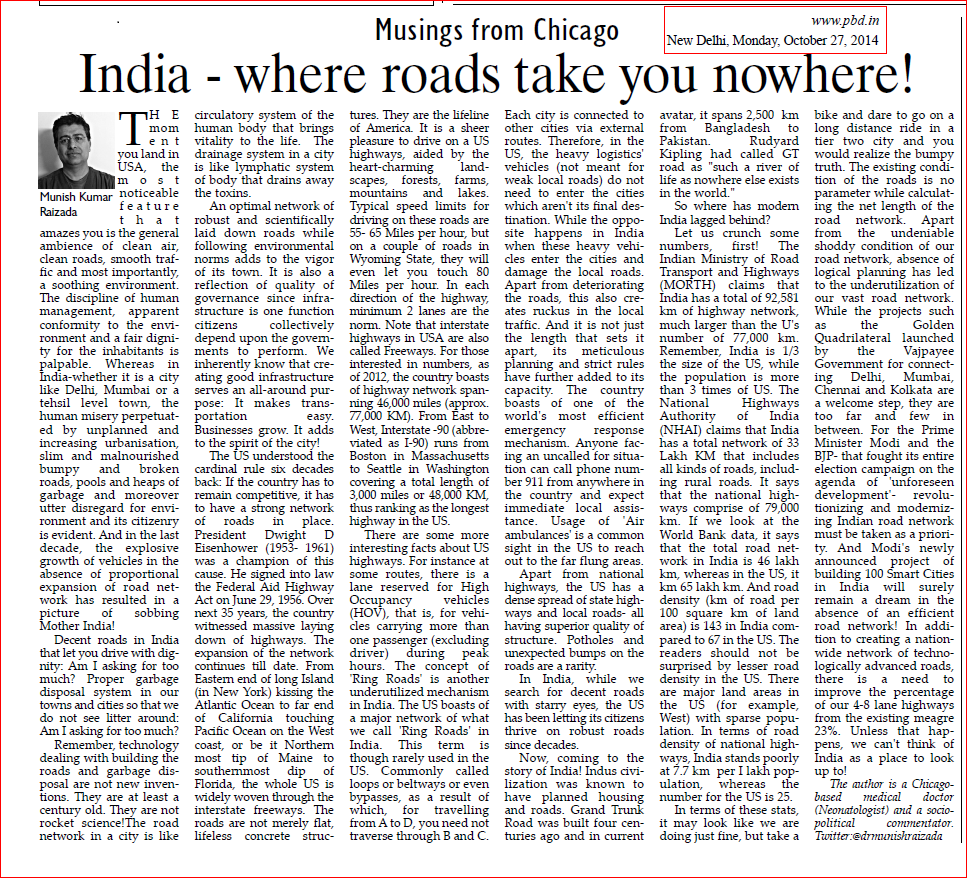Decent roads in India that let you drive with dignity: Am I asking for too much? The road network in a city is like circulatory system of the human body that brings vitality to the life. We must understand that good roads are a prerequisite for the ‘promised’ smart cities.
This is the theme this time of my weekly column “Musings from Chicago” published in the ‘Political & Business Daily’ on October 27,2014.

Category Archives: Policy Matter
RTI: Need to implement more honestly
RTI Assessment and Analysis Group (RaaG) and National Campaign For People’s Right to Information (NCPRI) have conducted a study on Right to Information (RTI) act. The study revealed that the Information Commissions are going easy on RTI complaints and almost 96% of the cases where there has been a delay or denial on information on RTI query have not been penalized.
On studying RTI responses from 21 information commissions, the study has found that 2.21 lac cases had been disposed of between January 2012 and November 2013. It was observed that penalty should have been imposed on 1.04 lakh cases (between January 2012 and December 2013) but only 3870 cases were penalized. Rs 5.03 crore should have been recovered from 22 states BUT only Rs 85.57 lac was recovered by 18 states.
Information commissions also have the power to award compensation to a complainant for the loss suffered. Although the number of complaints of delay or denial of information equaled to 3.89 lac, the compensation was awarded only in just 1339 cases. The amount of compensation imposed was Rs 29.68 lac but only Rs 4.07 lac was recovered.
A strong RTI act is crucial for strengthening democracy. It makes the Government more accountable and transparent and is the biggest weapon against corruption. The soft approach of information commissions will only weaken its power and defeat the very purpose of RTI act.
Rosy scene of Polio eradication in India
October 24: Today is World Polio Day. Today marks the duration of India being polio-free since three consecutive years. It is, indeed, a historic day for our country!
In India, the oral polio vaccine was introduced in 1985 in the Universal Immunization Program at a time when India was reporting almost 200,000 cases of polio annually (as per estimates of the Indian Academy of Pediatrics). However, with the introduction of Pulse Polio Program in 1995, the scenario started changing quickly. But, polio continued to trick us. Until the year 2009, almost fifty percent of the reported case globally were from India. Therefore, looking at the chronology of the polio disease, Pulse Polio program is a truly a success story that we can take pride in.
But, we must not sit on laurels! Continued surveillance is the key. Prevention of the disease with oral polio drops in pulses (that is, Pulse Polio program) must continue nationwide. This is also the right time to introduce injectable pulse polio vaccine (killed vaccine, also called Salk vaccine). The latter is the norm where polio is not prevalent. The killed vaccine is easy to store and the biggest advantage is that it does not cause vaccine-induced paralytic polio disease. With the oral vaccine (which is a live vaccine), the polio disease can actually happen- as an adverse effect- though it is extremely rare.
Polio continues to be a fixture in our neighboring countries of Afghanistan and Pakistan. This can upset our apples’ cart. Thus, there is also need to continue efforts, collaboration with world health agencies so that we see the end of Polio from the earth. Remember, polio is 100 % eradicable disease. It is doable.
Britain goes for Right to Recall: what about India!
Citizens of Britain are all set to get the RIGHT TO RECALL which will allow voters to demand a by-election to seek an opportunity to replace a sitting Member of Parliament. The voters would be required to get the signatures of at least 10% of registered voters of that constituency in an eight-week period. This procedure will only be initiated if MPs are given jail sentences or if the House of Commons agree that they have engaged in serious wrongdoing (in my opinion, this right should not be left to the House. If voters want to RECALL, let them gather up to reach 10 % number of signatures. In USA, this number is 25 %).
Right to Recall can be a cumbersome process and is rarely used as a weapon by the citizens because of its complex applicability. Nevertheless, the existence of this provision exerts a pressure on the elected representatives to be more accountable towards the public. It also gives a chance to the public to keep a more effective tab on its elected representatives.
Many countries including USA have empowered their voters with the tool of Right to Recall. Britain will soon get it. India should also move in this direction. We in India do not have it! Aam Aadmi Party is the only political party that has been vociferously demanding the two tools that will change the political landscape forever: Right to Reject and Right to Recall.
Will Indian law-makers take a cue from Britain and go for it since it is never too late to deliver something good!
Will Modi take up the fight to de-criminalize Indian politics?
Last week, the Election Commission of India made a few proposals for electoral reforms to the Law Ministry, which have further been referred to the Law Commission.
Two important issues that Election Commission has raised are:
1. The EC proposes that if a person is accused in a criminal case where the (minimum) punishment is imprisonment of five years and charges have been framed by the competent magistrate at least six months before the scheduled date of election, then in that case he should be DISQUALIFIED from contesting elections.
I personally welcome the Election Commission’s proposal. If implemented, it will effectively help in decriminalizing politics in India.
2. Another proposal made by the Election Commission addresses the malpractice of filing of false affidavits by the candidates before elections.
As per the proposal: A person who files false affidavit will not only be given some punishment but also would be disqualified from contesting elections.
The aforesaid disqualification clause can prove to be a major deterrent to the candidates from telling lies.
The task of nation building can not be accomplished without taking some tough decisions. Electoral reforms that help cleanse the system of goons and criminals should be a priority for the Modi government. I hope Prime Minister Mr. Modi implements these proposals without any delay.
Abolish Booth-wise vote count
During assembly and Parliamentary elections, you go to cast your secret ballot at a Pooling Booth. Typically, 1000-1200 voters are assigned to one booth. Each polling booth has one Electronic Voting Machine (EVM).
When the results of elections are declared, people get to know which candidate got how many voters overall. That is for sure! But, election commission also declares the details to the tune of each EVM or Polling Booth. In other words, a candidate or party comes to know how many votes were polled in favor or against from that particular segment of voter population.
The Election Commission had recommended that the practice of declaring results at Booth level be abolished as it exposes the voters preferences to the political parties and candidates.
The Supreme Court asked the Central government yesterday while hearing a Public Interest Litigation: “Why are you sleeping over a 6 years old proposal of Election Commission to stop Booth-wise counting of votes”? The Center’s counsel replied: “The proposal has been sent to the Law Commission”.
What a lethargy pace! Our tortoise of the rabbit-tortoise story will be put to shame by the Indian government!
Abolition of declaration of results at the EVM-level is a much needed reform in our electoral democracy. Politicians with vindictive attitude exploit this information to take vengeance if voters of a particular booth(s) did not vote for him/her. Remember the incidence of Maharastra Chief Minister Ajit Pawar threatening voters in villages of Baramati Lok Sabha seat? Mr. Pawar was campaigning for his cousin Ms . Supriya Sule – a Nationalist Congress Party (NCP) candidate in the last Lok Sabha elections held a few months back.
Let us hope the wheels of Mr. Modi-led government would move faster as he won elections on the plank of ‘vikaas’!
Black Markets thrive in India
How much money lies in white in India (and abroad, by Indians) and how much money lies in black?
What is BLACK money? In today’s technology-driven era, monetary or financial transactions happen 24×7. The transactions where a portion of the money should go to the government, but does not happen is a black money. For example: If sales tax is not paid, income tax is not paid or where dues or fees are not paid but go to the intermediary hands (bribery, greasing palm), they constitute black money. Who suffers if black market thrives? The treasury (sarkaari kosh/khazaana) suffers and in the process, and consequently we all suffer because development work (civic amenities like roads, bridges, schools and other govt related works) does not happen as expected.
An article published today in The Hindu says that as per latest estimates, 75 % of Indian economy could be in form of BLACK money.
It is difficult to reliably estimate how much treasure lies in black markets! To get some idea, the UPA government led by Mr. Man Mohan Singh had commissioned the National Institute of Public Finance and Policy (NIPFP) to undertake this task. The report was submitted to the then Finance Minister Mr. P Chidambaram, but as the news reveals, he never brought it out. The file now lies with Mr. Arun Jaitely, the current Finance Minister.
The 3 sectors contributing most to black economy are: Capitation fee for higher education sector, Real estate deals, and Mining industry. For example, last year capitation fee collected in clandestine manner by private colleges was to the tune of approx. 6000 Crores.
If the law of land is strong, if it is easy for people to do businesses in more transparent way, when financial laws are not complex and where government makes it easy for its citizens to do businesses through technology (e-governance), black markets will find it difficult to grow. But if politicians and businesses join hands to foster a mutually rewarding relationship, the interests of the the public are often ignored under such circumstances. This is called crony-capitalism.
Q: Can govt control black markets?
A: Yes, a strong government can. I mean you do not have to be physically strong. The intent to curb corruption is enough to make a headway in this direction.
Q: Do we have a strong govt at the Center?
A: Suna to yahi hai! But, does the current BJP party – even though with clear majority in the Parliament- has a clear financial integrity as its goal and objective? If its house is not in order, how can it bring semblance to the financial order of the country?
To read the details , click to view the article here.
Reliance is NOT reliable!
July 14,2014: The BJP’s Narendra Modi-led Central Government has decided to penalize Reliance Industries for producing less than targeted natural gas from KG-D6 block. The Oil Minister Dharmendra Pradhan said that Reliance India Limited (RIL) has been slapped with a new fine of Rs.3,500 crore ( USD 579 million). Interestingly, if you calculate such penalties in last 4 years for RIL, it stands at a towering amount of Rs.14,300 crore (USD 2.376 billion). This has prompted Aam Aadmi Party (AAP) to urge the government to simply shunt Reliance out. AAP’s argument is that RIL has committed so many defaults that there is a strong basis for the government to now scrap the contract.
However, on the contrary, is not Modi government shielding Reliance?
In June of this year, Anti-Corruption Branch of Delhi issued notice asking if any penalty had been imposed for underproduction of gas. This question becomes much more relevant since a hearing in Delhi high court is due on 1st August on the basis of FIR lodged by AAP Government (in Delhi) in February,2014 against Reliance Industries.
The penalty that has been imposed today may just be a PLOY of Modi Government to withdraw the FIR against Reliance Industries. It is time that the Modi acts tough against erring companies and sends a signal that his government means business. Acting soft on such matters gives an impression that Mr. Modi is not able to crush crony-capitalists.
The press statement of Aam Aadmi Party in this regard can be accessed via this link.
Railway fare hike: Will the wheels move faster?
Electoral reforms Needed in India
 The way last 2-3 years have witnessed the peoples’ movements (India Against Corruption), the nation has clearly come to realize that there are many fallacies with our system of politics and governance. Hence the need of reforms is being starkly felt!
The way last 2-3 years have witnessed the peoples’ movements (India Against Corruption), the nation has clearly come to realize that there are many fallacies with our system of politics and governance. Hence the need of reforms is being starkly felt!2.The provision for ‘negative voting‘ so that a ‘bad’ person could be precluded from getting elected.
3.Vote to ‘recall’: even though a complex exercise, voters should have access to this electoral weapon!
4. Initiative: Where public could initiate a proposal. If it reaches certain threshold, the legislation must be bound to take it up and enact the law,
4.Anti-defection law should be made much more stringent
5.Post-poll alliances should be governed by certain rules.
6. Election Funding by State: This will greatly help reduce the influence of money in elections and motivate well-meaning people to try electoral politics.
7. Election Commission should audit the accounts of political parties. This will help decrease the influence of black-money.
Similarly there could be many more reforms to sharpen our electoral system.

